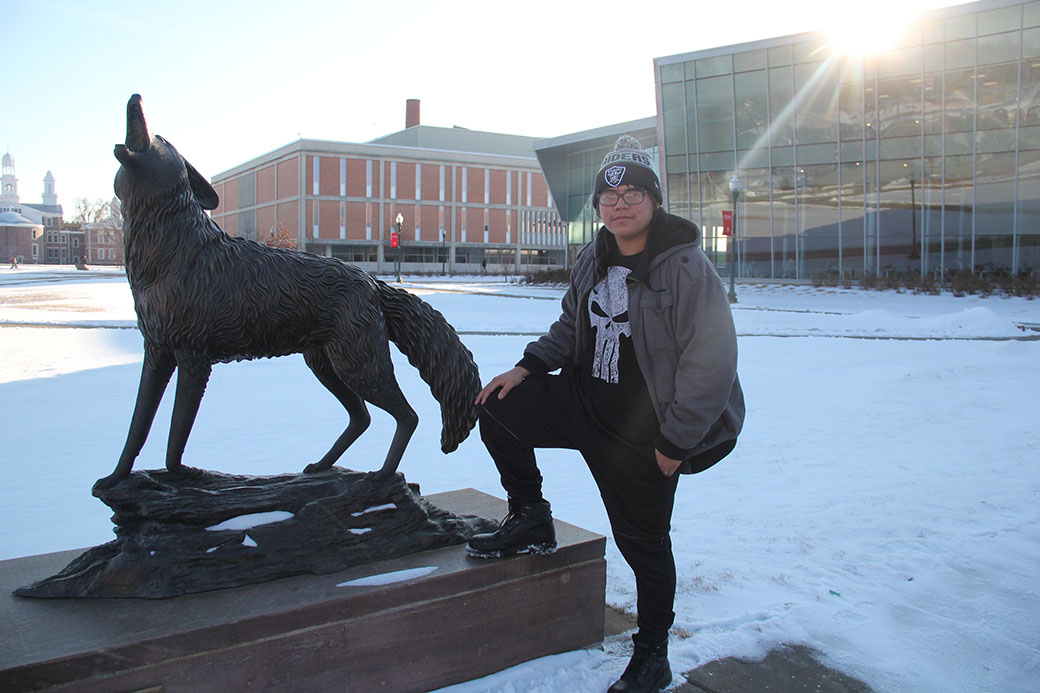
People of the Pack: Antone Morrison
Antone Morrison is a first-year business major.
Morgan Matzen: What do you hope to do with your major?
Antone Morrison: I was hoping on doing something towards the financial side and going into law. I want to be able to be a coordinator of nonprofits because I’m from a reservation. I’m from Pine Ridge, South Dakota, Oglala Lakota. I want to be able to send people in that actually do the job to help impoverished parts of the reservation. That’s my current goal, but anything can happen really.
MM: Do you know what kind of work you’d like to do with a nonprofit someday?
AM: Most of my work is going to be helping the community and rebuilding ourselves rather than depending on the federal government to step in and feed us out of hand. I want to be able to get our people involved and be a part of the community in a larger sense to where we can all come together and face common issues like poverty, teen suicide and all that, which we are doing. I want to be able to step in and do my part.
MM: Have you had any experience helping the community like that before?
AM: I love my people, I would do anything for them. That’s just how I was raised — to protect and do my best as a person in my community. I’ve been raised by my grandmother and share that compassion. Instead of looking at all the negatives, I try to focus on the positives and maybe something good will come.
MM: What is the most important lesson that your grandmother or anyone in your family has taught you?
AM: I say be aware. Be aware of who you are and where you stand in life because that will determine what you do in the future. It’s like being humble, in a sense. Know who you are and do what you have to do. Life is too short to say I can’t do this, I can’t do that. It’s whether or not you can try, or whether or not you can fail and retry again. It’s all about resilience and the will to do better. That’s what I learned from my grandmother, because she’s been through a lot. She raised three kids before she raised me. I respect her and I love her. She’s taught me a lot. Her name is Mona Little Hawk.
MM: Who else is influential to you?
AM: Most of my elders that I know from back home and people I sweat with. I would say some of my teachers, like Mark Tilsen. He’s a big advocate as well against DAPL and protecting water rights and treaty rights. There’s a lot of people who encourage me to be better than I was the day before, like my mother, my little brothers and also my brothers here who share the same goal. They’re not my actual brothers, but they have the same mindset as me and the same want to do better.
MM: Can I ask how you feel about the pipeline?
AM: There’s multiple perspectives on how to look at it, but I think in reality, the negative impacts will mostly outweigh the positive impacts of building. It’s already broken in some parts downstream, as I heard. I mean, we can find better ways to transport or come up with better renewable resources, but it also costs money. That’s that factor. Me, personally, I’m against DAPL. Millions of people depend on the water in the Missouri River. That’s what it’s there for. We’re the caretakers of this world, essentially in our culture. It’s common around most cultures. All in all, it’s either money or people.
MM: Is there anything else you’d like people to know about you?
AM: If you’re looking in on a different culture, get rid of your mindset of how that culture is portrayed. Get rid of your filter that you have in place and how you see how that culture is. Like a person of color and how you think that group is, eliminate that. If you really want to learn, you’ve got to start by ignoring who they are instead of how they are perceived as being stereotypes.

